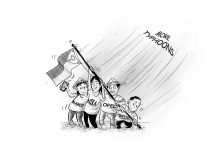SAMMY JULIAN
THE second most-visited tourist site in Israel after the Western Wall is Yad Vashem, the official memorial to the Jewish victims of the Holocaust. It is located on the western slope of Mount Herzl on the Mount of Remembrance in Jerusalem.
The complex houses the Holocaust History Museum, memorial sites such as the Children’s Memorial and the Hall of Remembrance, The Museum of Holocaust Art, sculptures, outdoor commemorative sites such as the Valley of the Communities, a synagogue, archives, a research institute, library, publishing house, and an educational center, The International School for Holocaust Studies.
Yad Vashem also honors non-Jews who saved Jews during the Holocaust, at personal risk, as the Righteous Among the Nations.
One example of which is the late President Manuel L. Quezon’s benevolent gesture of accepting Jews in the country more than 70 years ago. This magnanimous act is manifested in his “Open Door Policy” toward Jews escaping the tyranny of Nazi Europe in the 1930s.
Quezon’s policy earmarked 10,000 visas for the Jews which facilitated their unrestricted entry into the Philippines during the time when the world was in turmoil and in the brink of total war.
Around 1,300 Jews were able to make it to the Philippines, settled and started a new life in a small community in Marikina where a piece of land was donated to them by President Quezon.
The late Frank Ephraim, who authored the book, “Escape to Manila,” and Max Weissler, were part of the 1,300 Jews who settled in the Philippines. Many more would have had followed suit had not been for the Japanese invasion.
Ephraim dubbed the movement of the Jews from Europe to the Philippines as one “from Nazi Tyranny to Japanese Terror.”
The Japanese invasion was a difficult ordeal for those Jews who had found safe haven in the Philippines, as they knew that their lives were again in danger since Nazi Germany and the Japanese expansionist regimes allied themselves and had sown terror in pursuit of their objectives.
Weissler, on the other hand, has always been thankful for the generosity of the Filipino people which was granted to them in their time of need even after more than half a century has passed.
Wherever he may be, official or personal, he always recounts vividly his journey to the Philippines and the life his family had when they settled in Manila.
Weissler was one of the driving forces that paved the way for the erection of the Open Doors Monument in Rishon Lezion which symbolizes Israel’s recognition of the Philippines’ benevolent act performed more than 60 years ago.
Since its completion, the Israeli government has publicly acknowledged the Philippines’ role in saving the Jews in the past, in addition to the instrumental vote of the country in the United Nations that led to the eventual creation of the State of Israel.
Weisler is a living testament to the heroic deed of President Quezon who did what other nations could not or did not do during the difficult ordeal of the Jews in Europe.
However, although the government of the State of Israel has been vocal in recognizing and appreciating this important piece of history, a simple recognition from Yad Vashem remains elusive for many years.
But all this changed after Philippines formally presented last year its bid for Yad Vashem to recognize President Quezon’s policy.
The petition seeking Yad Vashem’s recognition of President Quezon’s efforts was subsequently and unanimously passed by the members of the Jewish War Veterans Jerusalem Post 180.
Without a doubt, what President Quezon did was the right thing to do. He was well aware that doors have been shut for the Jews out of fear or other reasons.
Saving a thousand Jews 70 years ago ensured the survival of many generations of Jews today and beyond.
This week we are heartened to learn that the “Open Door Policy” continues more than seven decades after Quezon first espoused it.
On Thursday, at the premiere screening of a documentary on the escape of Jewish refugees to the Philippine, President Benigno Aquino III declared that the country is committed to keep its door open to refugees or stateless people and help respond to their needs despite stringent immigration laws.
Before viewing the documentary, “Rescue in the Philippines: Refuge from the Holocaust,” at the Palace, the President acknowledged that the country has become “a host to a lot of refugees,” including Jews who wanted to escape Nazi persecution, Russians after the Russian revolution, and Vietnamese boat people after the Vietnam war era. (To be continued/PN)



